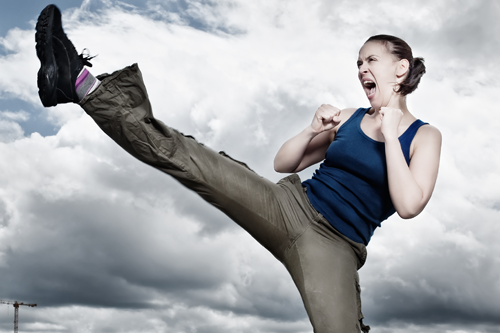 I was holed up in my living room watching whatever came on the TV when I saw the man in the space suit attack a woman half his size. She slaughtered him…and a neutron bomb exploded in my brooding, overactive brain.
I was holed up in my living room watching whatever came on the TV when I saw the man in the space suit attack a woman half his size. She slaughtered him…and a neutron bomb exploded in my brooding, overactive brain.
Women are built differently from men, so to fight off an assailant, we must learn to use those parts of our bodies that are most powerful—hips and thighs. We also need to learn verbal skills to avoid ever having to fight.
The premise of the women’s self-defense course was simple: Women are built differently from men, so to fight off an assailant, we must learn to use those parts of our bodies that are most powerful—hips and thighs. We also need to learn verbal skills to avoid ever having to fight.
In our first class, nine of us of varying ages, body types, and neuroses are introduced to the concept of muscle memory by a friendly, articulate female teacher. “You can learn to ride a bike when you’re eight,” she tells us, “and, even if you don’t ride again until you’re thirty-five, your body remembers how to do it.” The first exercises are in slow motion, in what is called the “adrenaline state,” where all thought processes stop and our bodies can learn to react differently and successfully to an attack.
In slow motion we rehearse eye and chin strikes; knee blows; controlled, well-placed kicks. We learned to speak: “Back off.” “Stop right there.” We learn not to smile as we bellow “NO.” (Amazing how difficult that is for so many women.) We learn to say what we feel rather than accuse. We learn to trust our own instincts.
“Let him take you down,” coaches the female teacher, and person after person has to unlearn her natural impulse to freeze or fight, and train her body to relax…so she can get to the ground and use the full force of her legs to kick her attacker where it hurts.
After the first class, the teachers warn us that we might be a little sore. I was an aerobics junkie for ten years. I’ve experienced the morning after first horseback riding. I know soreness. And none of that has prepared me for my complete body paralysis the next day. It takes many hot showers and several more classes for me to figure out why some women are fine and others can barely move: We hold different body memories. If memories are held in our muscles, then if we’ve been victimized in any way (psychologically or physically), the memory of this is in our body—regardless of whether we hold these memories in our mind—and a real attack with a new learned response is like having complete body surgery. And surgery hurts. Our degree of soreness correlates to our body memories.
No, this is not about anger, we answer. This is not about wanting to beat people up. This is about wanting to feel—to know in every cell of our bodies—that we are safe. It is very hard to express or accept love when you constantly feel that your personal boundaries are vulnerable. For it is only when you know you are secure that you can truly open your heart.
And at the end of the 20 hours, we graduate. In front of an audience of friends and family, we fight, we scream, we win. We hold hands, face our audience, and feel like warriors in some ancient tribal ritual. The audience is quiet now. Some smile, some cry, some look horrified and ask shy questions.
No, this is not about anger, we answer. This is not about wanting to beat people up. This is about wanting to feel—to know in every cell of our bodies—that we are safe. It is very hard to express or accept love when you constantly feel that your personal boundaries are vulnerable. For it is only when you know you are secure that you can truly open your heart.
I wonder if countries have body memories.
Click here to see Rose’s tips for healthy and happy relationships



